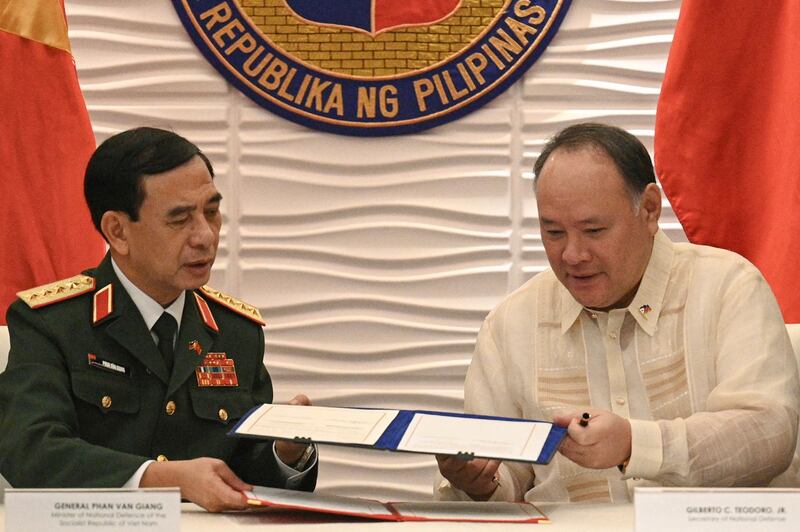Updated Sept. 4, 2024, 00:01 a.m. ET.
Philippine President Ferdinand “Bongbong” Marcos Jr. edited a popular social media post about the defense cooperation between his country and Vietnam.
In a Facebook post last Friday, endorsed by nearly 7,000 readers, the president wrote that the two countries "have elevated Philippines-Vietnam relations to greater heights with the visit of Vietnam's Defense Minister, General Phan Van Giang."
Giang made his first official visit as minister to Manila that day, calling on Marcos and holding bilateral talks with his counterpart, Gilberto Teodoro Jr.
“We thank Vietnam for supporting the Arbitral Award,” Marcos wrote, after the Vietnamese general’s call at the presidential palace.
He was referring to a 2016 ruling by an Arbitral Tribunal set up under Annex VII of the U.N. Convention on the Law of the Sea, or UNCLOS, which rejected all of China's claims in the South China Sea, deeming them unlawful.
China and the Philippines – as well as Vietnam – have rival territorial claims in the waterway together with another three parties.
Vietnam, however, never announced explicit support for the arbitral award even though it stood to greatly benefit from the ruling and was thought to have considered its own legal action against China.
Vietnamese spokespeople have only ever stated that Vietnam strongly supported resolving South China Sea disputes by peaceful measures, including diplomatic and legal proceedings.
It is unclear whether the Vietnamese side has made any request regards the message from Marcos but he redacted the sentence on Saturday.
The post now reads: “Together, we remain committed to peaceful resolutions, de-escalating tensions and ensuring that the rule of law and a rules-based international order prevail in our region.”
The same redaction was made to a similar post on the president’s Instagram page.
Over-expectation
There was also a lot of confusion in the Philippine media about what would be achieved during Phan’s visit, especially after Defense Secretary Gilbert Teodoro Jr. told an international military forum in Manila on Aug. 27, “We can hope to get some agreements signed once clearances are made.”
In the end, the two defense chiefs did not sign an agreement but exchanged letters of intent on enhancing cooperation on humanitarian assistance and disaster relief at sea, and military medicine.

“I think it's more about interpretation of the relationship, and of course there is over-expectation from Manila here and there,” said Nguyen The Phuong, a Vietnamese military analyst at the University of New South Wales (UNSW) in Canberra.
“The Marcos administration always has a demand for giving out political messages to his domestic audience,” Phuong added.
RELATED STORIES
[ Vietnam, Philippines to sign defense cooperation agreementOpens in new window ]
[ Philippine, Vietnamese coast guards sail together to bolster nautical cooperationOpens in new window ]
[ Philippines, Vietnam set to boost cooperation in South China SeaOpens in new window ]
Tensions are rising between Manila and Beijing over some reefs in the South China Sea that lie within the Philippines’ exclusive economic zone but are also claimed by China.
Analysts say that Vietnam has been very careful not to be seen as siding with any country against China.
Giang reportedly reiterated at the meeting with Marcos that Vietnam was pursuing a so-called Four Nos defense policy: No military alliances; no siding with one country against another; no foreign military bases in Vietnamese territory or using Vietnam as leverage to counteract other countries; and no force or threat of force in international relations.
Yet the minister hinted at the prospect of signing a new bilateral document to replace the Memorandum of Defense Cooperation between the two ministries signed in October 2010.
“Defense Minister Phan Van Giang’s visit to Manila likely went better than expected as both sides agreed verbally to a wide range of future defense cooperation activities,” said Carlyle Thayer, a veteran Vietnam watcher and emeritus professor at the Australian Defence Force Academy.
Maritime security and safety, logistics, and the defense industry are among potential areas for collaboration and Thayer said the two sides had reportedly earmarked the 80th anniversary of the founding of the Vietnam People’s Army on Dec.22 for the signing of a memorandum of understanding on defense cooperation.
“Manila has accepted to participate in the second Defense Expo in Hanoi in December,” said UNSW’s Nguyen The Phuong, “There will be some agreements achieved at the event but they will focus on non-combat domains such as defense industry, information sharing, exercises and military exchanges.”
Corrected to note that the Arbitral Tribunal was set up under UNCLOS, not the Permanent Court of Arbitration.
Edited by Mike Firn.
